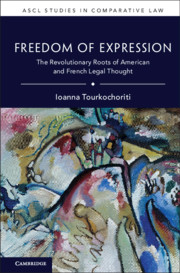Book contents
- Freedom of Expression
- ASCL Studies in Comparative Law
- Freedom of Expression
- Copyright page
- Contents
- Acknowledgments
- 1 Introduction
- 2 Antiquity, Modernity, and Historical Imaginaries on the Role of the Government
- 3 The Underlying Ex Ante Understanding of Liberty
- 4 The Moralizing Rational Republic versus the State Arbitrator of the Free Play of Interests
- 5 Foundation of the Rights of Man on the Rights of the Citizen versus Foundation of the Rights of the Citizen on the Rights of Man
- 6 Conclusion
- Bibliography
- Index
5 - Foundation of the Rights of Man on the Rights of the Citizen versus Foundation of the Rights of the Citizen on the Rights of Man
Published online by Cambridge University Press: 29 October 2021
- Freedom of Expression
- ASCL Studies in Comparative Law
- Freedom of Expression
- Copyright page
- Contents
- Acknowledgments
- 1 Introduction
- 2 Antiquity, Modernity, and Historical Imaginaries on the Role of the Government
- 3 The Underlying Ex Ante Understanding of Liberty
- 4 The Moralizing Rational Republic versus the State Arbitrator of the Free Play of Interests
- 5 Foundation of the Rights of Man on the Rights of the Citizen versus Foundation of the Rights of the Citizen on the Rights of Man
- 6 Conclusion
- Bibliography
- Index
Summary
In France, the dominant conception of natural law echoes that of the Ancients, according to which the natural state of humanity is social. Men and their liberty reach their perfection in society. If it is being a citizen that makes a human being, then the rights of a person are those that are recognized for them by political society. The rights of the man are founded upon the rights of the citizen. The American Declaration of Independence, the state bills of rights and the Amendments to the Federal Constitution emerged in a different intellectual atmosphere. A conception of rights as “natural” was dominant in the period that led to the Declaration of Independence. This conception built on a tradition of constitutionalism that emerged in the American colonies in the seventeenth century. If rights are recognized only to the extent that they promote the public good, as is the case in France, then it is legitimate for the state to define the content and limits of freedom of expression. The natural rights philosophy dominant in the United States makes similar limitations illegitimate. Current First Amendment doctrine reflects these ideas.
- Type
- Chapter
- Information
- Freedom of ExpressionThe Revolutionary Roots of American and French Legal Thought, pp. 198 - 230Publisher: Cambridge University PressPrint publication year: 2021



